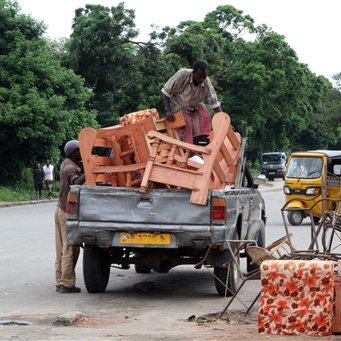Last month, the United Nations Security Council passed a resolution condemning rising violence in Burundi, where protests against an unpopular president seemed to be spiraling out of control. Outlets including Newsweek, London’s Telegraph, Kenya’s Daily Nation, AFP, and the Toronto Star reported the diplomatic machinations with worry, and warned of impending genocide. “More Than 21 Years Later, Washington Has Another Problem From Hell,” announced Foreign Policy.
But was “genocide” the right term? Within weeks, as the Burundi crisis unspooled, a series of articles pushing back against the genocide narrative began to pop up. Most prominently, The Guardian, which had earlier run a long Reuters report warning of genocide, flipped its message, reprinting an item from South Africa’s Daily Maverick under the headline: “Stop Calling the Violence in Burundi Genocide.”
“Although Burundi has experienced serious ethnic violence before, between Tutsis and Hutus during its civil war,” wrote Patrick Hajayandi, a Burundian policy analyst, “the current crisis is much more political, and not divided along ethnic lines.
The pushback against the easy genocide narrative in Burundi, which perhaps not coincidentally neighbors Rwanda, another small African country that has largely been defined in the international press by its devastating 1994 genocide—also appeared in The Washington Post. On November 15, the paper published a pointed op-ed by two international relations scholars, Kate Cronin-Furman and Michael Broache. “The motivation for the article is looking at why this particular term is problematic,” says Broache.
As in the Hajayandi item, Broache and Cronin-Furman, who study the politics of mass violence at the University of Tampa and Stanford, respectively, write that Burundi’s crisis, already serious, could worsen if understood as ethnic genocide rather than what it really is: a fight between president Pierre Nkurunziza and his political opposition. “Clarity about who is at risk of being attacked, and why, is crucial for protection efforts,” the two academics wrote.
It’s hardly unusual for the media’s take on an international story to change amid ongoing events. But the Burundi narrative shifted unusually sharply and quickly, and seemed to be responding less to new developments on the ground than to informed attention from a small group of reporters and analysts with experience working in the region, who brought a niche conversation into the mainstream.
“It actually emerged from a series of interactions on Twitter,” says Broache. His colleague Cronin-Furman “had posted something to the effect that Burundi is not Rwanda, these are unhelpful analogies, and I kind of bandwagoned on that.”
A British freelancer who works often in East Africa, National Geographic contributor Jessica Hatcher, also voiced her support for Broache and Cronin-Furman’s interpretation from Burundi’s capital, Bujumbura, where she was on the ground reporting.
When Human Rights Watch President Kenneth Roth tweeted: “all Burundi signs pointing to Rwanda genocide redux,” The Guardian added a screen grab from commenter @digitaldjeli, the online handle of a longtime east Africa reporter who is well known in the region. “Is this really analysis or clickbait?” @digitaldjeli tweeted. “Burundi is violently dangerous but it isn’t Rwanda or genocide.”
#Burundi Is this REALLY analysis or is it clickbait? Burundi is violently dangerous but it ISN’T Rwanda or genocide https://t.co/8uXlC9K3Vb
— digitaldjeli (@digitaldjeli) November 15, 2015
The original Daily Maverick story questioning use of the G-word reported key facts about reforms in Burundi’s political system that earlier stories, focused on genocide threats, had not included. Author Hajayandi, the Burundian regional analyst, noted that Burundi’s army had been remade after ethnic clashes in the 1990s and was now split 50-50 between locals belonging to the Tutsi and Hutu ethnic groups. The national parliament was split nearly as evenly, 60-40, he wrote, making ethnic violence difficult to organize. “The ethnic composition of the government means it’s highly unlikely that it can be compromised to orchestrate mass killing.”
In this case, expertise won the day, and the comments swirling through the tight world of Anglophone east Africa experts stymied a knee-jerk response to an African conflict. On November 23, for instance, Time published a summary of the evolving crisis tied to its coverage of Pope Francis’s visit to East Africa that read noticeably differently from the spate of stories that had dominated earlier in the month. The piece made only a passing reference to possible ethnic or tribal schisms and cited “genocide” only in a quote from a State Department envoy, who himself cautioned nuance with the term: “Even if we do not see genocide, it is important for all actors to know that torture and extrajudicial killings conducted equally across ethnic groups does not make those actions OK.”
“There’s not a whole lot in the way of international presence” in Burundi, says Broache. “It’s not surprising that they would go to area experts in this case.” His story with Cronin-Furman appeared in the Post’s Monkey Cage blog, a space that frequently features academics addressing news events.
“Whether that’s a substitute for journalists on the ground, and for paying them,” Broache says, “is certainly an interesting question.”
Marc Herman is a reporter based in Barcelona. He is the author of The Wizard and the Volcano, The Shores of Tripoli, and Searching for El Dorado, and a co-founder of Deca.

